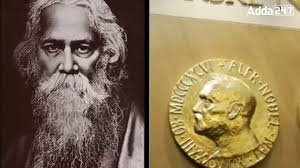The First Nobel Prize of India
Introduction to India’s First Nobel Prize
India’s journey to global recognition in the field of science and culture began with the prestigious Nobel Prize. The first Nobel laureate from India was Rabindranath Tagore, who was awarded the Nobel Prize in Literature in 1913. Tagore’s recognition was not just a milestone for India but also a reflection of the cultural and intellectual awakening that was taking place in the country during the early 20th century. This award marked India’s entrance onto the global stage, highlighting its rich heritage and contribution to world literature.
Rabindranath Tagore’s Contribution to Literature
Rabindranath Tagore, born in Kolkata in 1861, was a poet, philosopher, artist, and music composer. His work in poetry, short stories, and essays was groundbreaking. Tagore’s most famous work, Gitanjali, a collection of poems, was presented to the Nobel Committee as part of his submission. His writing expressed deep humanism, and his philosophy was rooted in the importance of individual freedom and self-expression. Tagore’s unique blend of Eastern and Western philosophies was a key reason why his work gained international recognition.
Tagore’s Legacy and Impact on Indian Society
Tagore was a multifaceted personality who not only wrote about the beauty of life but also critiqued colonial rule and advocated for Indian independence. His works were a blend of spirituality and patriotism, inspiring generations of Indians to embrace their culture while striving for social and political change. He also contributed immensely to Indian music, creating several iconic compositions, many of which became anthems of Indian freedom movements.
Global Recognition and the Nobel Award
Rabindranath Tagore’s Nobel Prize was a significant event in both Indian and global history. The Nobel Committee recognized Tagore for his “profoundly sensitive, fresh, and beautiful” poetry. The award helped to raise awareness about Indian literature and culture across the world. Tagore became the first non-European to win the Nobel Prize in Literature, paving the way for other Indian writers and intellectuals to be recognized globally.
Why This News is Important
Understanding India’s Contribution to Global Culture
Rabindranath Tagore’s Nobel Prize is not just a moment in history but a testament to India’s rich cultural and intellectual contributions to the world. His recognition elevated Indian literature and philosophy to an international level, allowing India to be acknowledged as a center for creative and intellectual excellence. The Nobel Prize helped India gain recognition in global cultural and scientific communities, marking the beginning of India’s involvement in international academic and literary circles.
Inspiration for Future Generations
Tagore’s achievement continues to inspire students, researchers, and artists worldwide. His success underlined the importance of cultural exchange and the global appreciation of different literary traditions. His win remains a benchmark for Indian writers, poets, and intellectuals striving for global recognition in their respective fields. The Nobel Prize not only validated his personal contributions but also helped to shape the Indian literary and cultural landscape that continues to thrive today.
Historical Context: Background Information
India’s Early Intellectual Growth
Before Rabindranath Tagore’s Nobel Prize, India’s intellectual and cultural landscape was evolving rapidly. The Indian Renaissance, which spanned the 19th century, saw a resurgence of interest in the arts, literature, and social reforms. Tagore was part of this intellectual awakening and played a crucial role in modernizing Indian thought. During this period, many prominent figures like Swami Vivekananda, Raja Ram Mohan Roy, and Bankim Chandra Chattopadhyay were also laying the foundation for a new India.
The Nobel Prize and Its Global Importance
The Nobel Prizes were established in 1895 by Alfred Nobel, a Swedish inventor and philanthropist. The Nobel Prizes were meant to recognize individuals or organizations that had made significant contributions to humanity in fields such as literature, physics, chemistry, medicine, and peace. Tagore’s win in 1913 made him the first Indian and first non-European to receive the Nobel Prize in Literature. This moment marked a turning point in India’s global recognition, contributing to the growing international interest in Indian culture, independence movements, and academic excellence.
Key Takeaways from “The First Nobel Prize of India”
| S.No | Key Takeaway |
|---|---|
| 1 | Rabindranath Tagore was the first Indian Nobel laureate, awarded the Nobel Prize in Literature in 1913. |
| 2 | Tagore’s most famous work, Gitanjali, played a pivotal role in his Nobel Prize recognition. |
| 3 | Tagore’s win was a significant event in both Indian and global history, elevating Indian literature on the world stage. |
| 4 | The Nobel Prize helped bring global attention to India’s intellectual and cultural contributions. |
| 5 | Tagore’s success continues to inspire future generations of Indian writers and intellectuals. |
Important FAQs for Students from this News
Who was the first Indian to win the Nobel Prize?
The first Indian to win the Nobel Prize was Rabindranath Tagore, who received the Nobel Prize in Literature in 1913.
What was Rabindranath Tagore’s famous work that led to his Nobel Prize?
Tagore’s most famous work, Gitanjali (Song Offerings), played a crucial role in his recognition for the Nobel Prize in Literature.
Why was Rabindranath Tagore’s Nobel Prize important for India?
Tagore’s Nobel Prize was a milestone for India, bringing global attention to Indian literature, culture, and intellectual achievements. It marked the beginning of India’s recognition in international academic and cultural circles.
What was the significance of Tagore’s contributions to Indian society?
Tagore was a key figure in India’s intellectual and cultural renaissance, contributing to literature, music, and social reforms, while also advocating for Indian independence from colonial rule.
When did Rabindranath Tagore receive the Nobel Prize?
Rabindranath Tagore was awarded the Nobel Prize in Literature in 1913, making him the first non-European laureate of the award.

